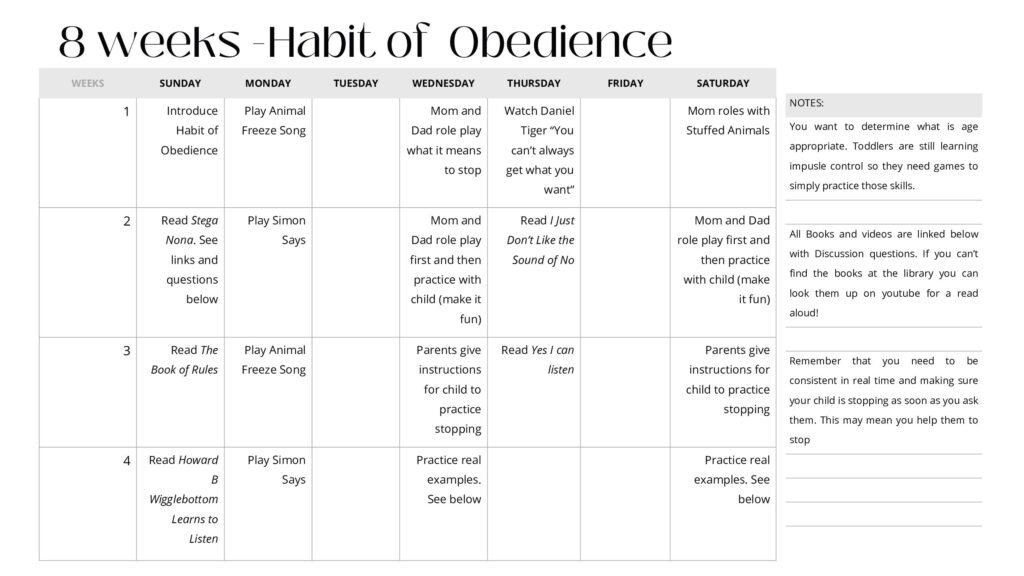This post is all about how to get your child to listen and obey, right away, all the way, and with a happy heart. Does that sound like a bit of a pipe dream?? Keep reading to see what that looks like for our family this year.

I have been flirting with the idea of Habit Training for our children. This idea originally came to me through the work of Charlotte Mason who writes at length about Habit Training. Now before you tell me how children are not dogs in need of training hear me out. We have zero problem training children in many other settings, like sports and even school. As a parent you would expect your child’s teacher to ‘train’ the kids in the classroom to raise their hand when they have an idea they wish to share. Without training them in that skill or habit, the classroom would be absolutely chaotic. Many people seemed to be trigged by the idea of training children in specific habits but as I read and think more about it, I strongly believe it is important not only for the child, but for the family. Let me tell you a story to illustrate this.
I have a 2.5 year old and an 8 month old, and on one beautiful winter day the three of us went for a walk. Part of the walk means crossing a bridge that goes over a very busy street. I have a wonderful strong-willed toddler and he really wanted to help me push his baby brother across the bridge, so I let him, as there were no safety concerns that I could foresee, and I was still maintaining control of the stroller by guiding it. When we got to the other side of the bridge I told him it was Mommy’s turn to push again, which he was ok with. We were headed down a slight incline and I had lowered the handle for him to grab. So in the 5 seconds I put my head down to raise the handle, my toddler had gone to the side of bridge and was approaching a small ledge leading up to a big drop-off. I instantly yelled “Asher, stop!” Being the curious toddler he was, he took a step forward. Guys, I haven’t felt this level of fear in a long time. As I mentioned, the stroller was headed down a slight incline so I couldn’t just let go of the stroller without my 8 month old crashing at the bottom. So, I quickly fumbled my way to getting the stroller locked as I again said, “Asher, you need to stop now”. As soon as I got the stroller locked, I went to grab him and everything was fine, other than the adrenaline surging through my body. This all took place in under 60 seconds. It was after that event that I decided I must train him to stop when I say stop. So now fast forward to later that afternoon when he was playing with something that I asked him to stop playing with. In the giant scheme of things it really wasn’t that big of a deal that he was playing with it — other than it was in his brother’s room and I was trying to put Charlie down for a nap. Definitely not life or death, but he still didn’t stop when I asked him to. The moment in the bedroom was an opportunity to form the habit that when mommy says stop he needs to stop immediately. It is not about me having control in that moment, it’s about me forming a habit so that when I do need him to stop because of a safety concern, he does, and I trust that he will.
As parents, we are often willing to pour hours of time into our children building skills, whether that is music lessons or sports or learning math; so why wouldn’t we be just as intentional about cultivating the skills we want our children to have as they become adults or to help our homes run more smoothly? Please hear me, I am not advocating for misuse of power. I am advocating for an intentional focus on cultivating skills that our children and families need to make everything run more smoothly. Parenting is hard enough, so why not thoughtfully focus on teaching and training what is needed to make everyone’s life easier. Maybe for your family it is cultivating a habit of separating whites and colors to make laundry a little easier. Maybe it’s cultivating habits like no touching food while grocery shopping. You are not depraving your child by training them to do things that make the family system function better. Again, I repeat, this is not abusing your place of authority in their life. This is lovingly discerning what your family and child need in this season and seasons to come.
How to Habit Train
- Select the habit you want to focus on and plan to focus on it for 8 weeks
- Talk to your child about it and why it is good!
- Create a plan for how you will practice that habit. You want this to be fun in the beginning as they learn this skill! You also want a scaffolded approach, so for those that are not in the world of education, scaffolding is where the teacher gradually removes support as the child learns the skill.
- One easy way to think about how to do this is:
- I do You watch -> We do together -> You do I watch -> You do I check
- One easy way to think about how to do this is:
- Be consistent!!! This is key to making a habit that is formed in a person and once it is formed it does not feel like a burden because it becomes a natural way of living that doesn’t require thought.
After doing a little self-reflection I must admit I am not very good at being consistent. The multi-tasking life of a mom often leads me to tell Asher to stop doing something by shouting it from the other room, and then not really doing anything when he doesn’t stop other than shout at him again. I am realizing that if I really want to create this habit and skill then I must be consistent. He is a toddler so he is developmentally not in a place to simply listen to my words and follow the directions all the time. I must intervene and get him to stop what he is doing when I want him to stop. Part of learning the habit entails teaching him that stop means stopping immediately. At this point that requires me making eye contact, telling him to stop, and if needed, physically helping him to stop. We are in step one of “I do you watch” so I need to show him what stopping means.
Some of you might be reading this and thinking she is promoting being a dictator or what’s the big deal with helping out once in a while, and I get that and realize this isn’t for everyone. Or maybe you just have a very obedient and diligent child that does what you ask, but not I said the fly. So for those of you that don’t have naturally obedient children or have a child that likes to beat to their own drum, maybe this is a strategy you’ll try this year to help them learn when it’s time to have their solo and when they need to follow the conductor.
This is the schedule and strategies we will be trying in the New Year to form the Habit of Obedience, specially, stopping when we say stop. Check out the full schedule in HERE or head over to the Resources page. If you have any suggestions of what has worked for you I would love for you to comment below!
